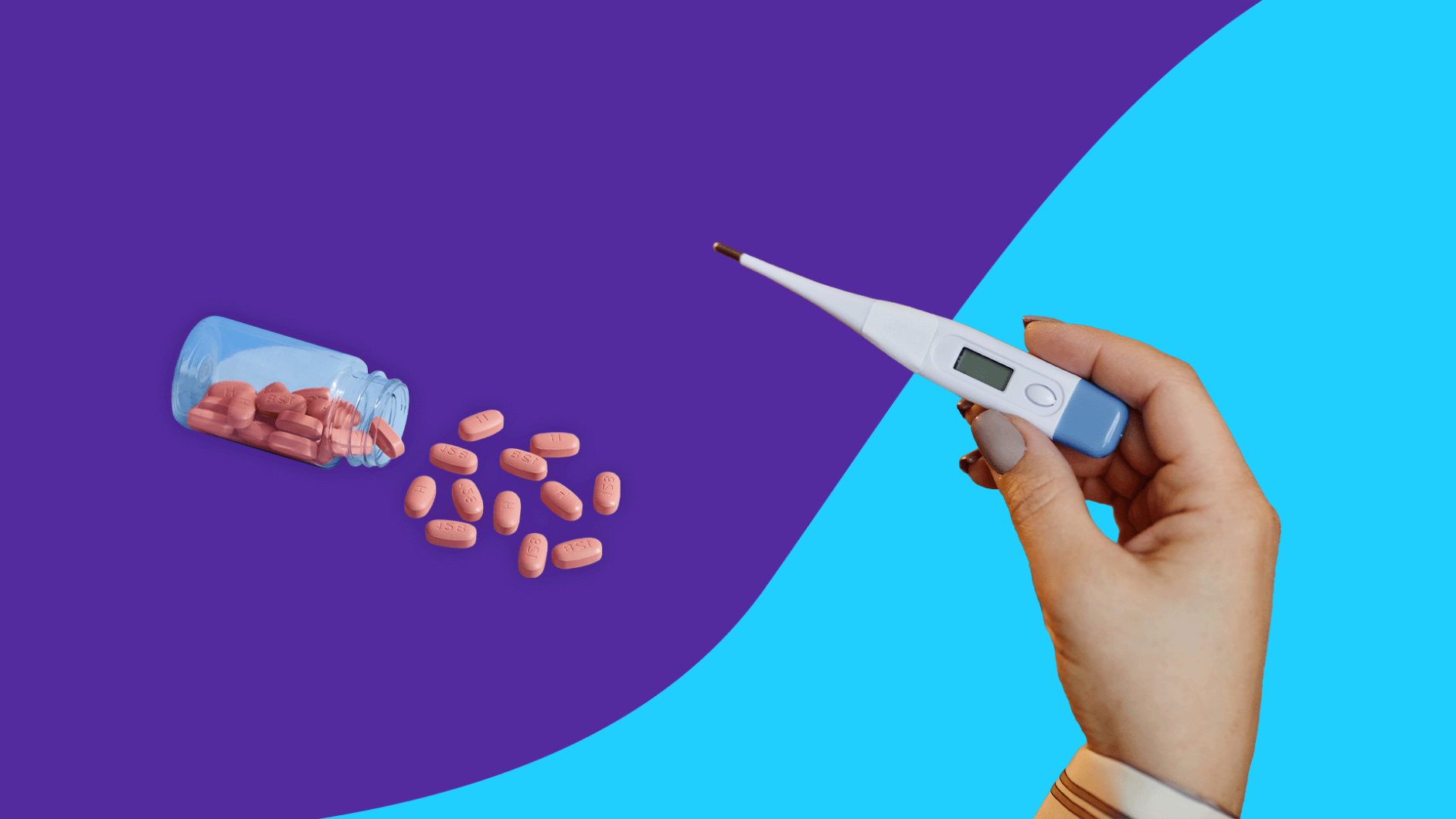A fever, or body temperature of 100.4 degrees or higher, is one of the first ways your body signals that you’re sick. It can also be pretty uncomfortable. As you fight off an infection, you’ll probably want to lower your fever and reduce the symptoms that often come with it, like sweating, chills, muscle aches, and weakness.
To relieve a fever with over-the-counter drugs, you have two choices: nonsteroidal anti-inflammatory drugs (NSAIDs), like ibuprofen, or analgesics and fever reducers, like acetaminophen. Many people reach for Tylenol (acetaminophen) when they have a fever, but ibuprofen is just as effective. Here’s what you should know about reducing fever with ibuprofen—and how to know if it’s a good option for you.
What is ibuprofen?
Ibuprofen belongs to a class of drugs called nonsteroidal anti-inflammatory drugs (NSAIDs), which reduce inflammation, relieve pain, lower fever, and prevent blood clots. Other NSAIDs include aspirin and naproxen (Aleve). Ibuprofen is available over the counter under brand names like Motrin and Advil. It’s also available in higher doses as a prescription.
Acetaminophen is not an NSAID; it’s an analgesic (pain reliever) and antipyretic (fever reducer). Although both ibuprofen and acetaminophen treat fevers, they are not the same type of medication.
Does ibuprofen reduce fever?
Ibuprofen lowers a fever if you take it when you have a fever. According to Daniel Kim, MD, a family physician with Medical Offices of Manhattan, most adults and children over 6 months of age can take ibuprofen to treat a mild to moderate fever.
In fact, over-the-counter (OTC) ibuprofen may be a better choice than acetaminophen when it comes to reducing fever in children: A 2020 meta-analysis comparing the effectiveness of ibuprofen to acetaminophen in kids under 2 years of age showed that ibuprofen was more effective at lowering body temperature.
While most people won’t experience side effects from ibuprofen, it isn’t safe for everyone. Dr. Kim notes that people with the following conditions should avoid it or consult with a healthcare provider before taking ibuprofen:
- People with certain medical problems, such as stomach ulcers or a history of gastrointestinal bleeding
- People with kidney disease
- People who are pregnant, especially in the third trimester
- People with heart disease or high blood pressure
- People with asthma
- People with a known allergy to NSAIDs or aspirin
If you take a blood thinner like Warfarin, use ibuprofen cautiously. Because ibuprofen prevents blood clotting, taking it with a blood thinner can increase your risk of bleeding.
How long does it take for ibuprofen to reduce fever?
Ibuprofen works pretty quickly, says Erika Gray, Pharm.D., chief medical officer and co-founder of Toolbox Genomics. Typically, you can see the effects in an average of 30 minutes after taking ibuprofen.
A recent meta-analysis comparing ibuprofen to acetaminophen found that children who took ibuprofen had a lower body temperature after one hour, faster than those who took acetaminophen.
Alternatives to ibuprofen for fever
If you can’t take ibuprofen for fever, your other choices are acetaminophen and aspirin. But if you can’t take any NSAIDs at all, avoid aspirin, too—though you aren’t missing much. Dr. Gray says aspirin doesn’t reduce fever as well as ibuprofen and acetaminophen, and there are more risks associated with giving aspirin to children and teens (like Reye’s syndrome), especially after vaccinations.
While ibuprofen may be slightly more effective than acetaminophen in reducing fever in children, Dr. Gray says the choice between ibuprofen, Tylenol, aspirin, and other fever-reducing drugs depends on several factors. These include your overall health, your age, and the symptoms you’re experiencing.
If you want to lower fever, reduce inflammation, and relieve pain, ibuprofen can do all of those things. In contrast, Tylenol can only lower fever and provide pain relief—but your overall health and other medical conditions may determine which medication is the best for you.
“An important point to remember with Tylenol and ibuprofen is what part of the body metabolizes, or breaks down, the medication,” says Dr. Gray. If you have elevated liver enzymes, liver damage, or any liver issues, be cautious taking acetaminophen; if you have decreased kidney function be cautious taking ibuprofen.
There are also some ways to help relieve fever symptoms at home, but Dr. Kim says it’s important to remember that they are not a replacement for medical care, especially if the fever is high or lasts for a long time.
For most mild to moderate fevers, however, Dr. Kim says you can:
- Drink a lot of water, herbal teas, or clear broths to keep from getting dehydrated
- Get plenty of rest so your body can heal and save energy
- Take a sponge bath with lukewarm (not cold) water to help bring down your body temperature. Pat dry. Let the drops of water still on the skin help take away the fever as you air dry.
- Put a cool compress on your face, neck, or armpits
- Keep your room at a comfortable temperature
If your fever still doesn’t go away after taking ibuprofen, or if it worsens, Dr. Kim recommends seeing a healthcare provider. They can correctly identify what’s causing it to avoid more severe complications.
If you have other serious symptoms, such as sudden or severe headache, difficulty breathing, persistent vomiting, lethargy, or confusion, seek immediate medical care rather than continuing to treat your fever at home.











